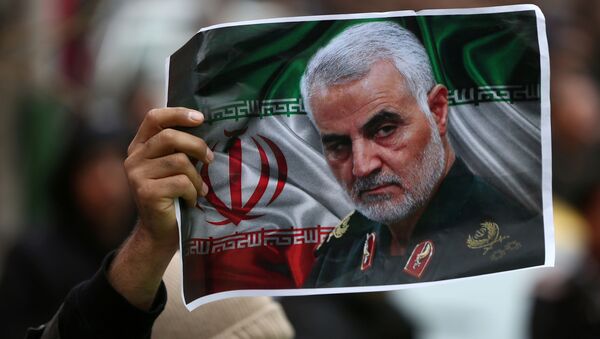The secretary of Iran’s Supreme National Security Council (SNSC), Rear Admiral Ali Shamkhani, said on Saturday that the assassination of General Qasem Soleimani by US forces was Washington’s “biggest gift” to terrorism in the region, according to Press TV.
“Resentment and grudge of the US and the Zionist regime [Israel] against […] Qassem Soleimani and Abu Mahdi al-Muhandis were due to their irreplaceable role in fighting Takfiri terrorism in the region and revealing the US' anti-terrorism charade,” Shamkhani said, addressing a meeting on Soleimani’s killing, according to the outlet.
The meeting, attended by number of Iranian judicial, political, security, intelligence, and military officials, was reportedly dedicated to a discussion on "political and legal aspects" of the extrajudicial killing of the general, one of the most respected figures in Iran, and making necessary decisions to speed up the process of retribution and justice for the assassination, according to Mehr News.
Shamkhani said that the international community “must appreciate the efforts and sacrifices” made by the late general Soleimani and al-Muhandis in the fight against terrorism in the region.
On Monday, Tehran’s prosecutor-general, Ali Alqasi-Mehr, announced that Iran has approved a measure to ask Interpol to put US President Donald Trump, along with dozens of US and foreign officials, on its international Red Notice of wanted persons over Soleimani's killing.
“It was possible to identify 36 persons who participated in preparations for and were involved in the assassination of Qasem Soleimani, among them political and military figures from the United States and other countries,” Alqasi-Mehr said in a statement. “At the top of the list is US president Donald Trump”.
Later in the day, an Interpol spokesperson said that they would not consider any Iranian request for Trump's arrest, citing the organization’s guidelines.
“In accordance with Article 3 of Interpol's Constitution, 'it is strictly forbidden for the Organisation to undertake any intervention or activities of a political, military, religious or racial character.' Therefore, if and when such requests are sent to the general secretariat […] Interpol will not consider requests of this kind,” the spokesperson said.
On 3 January, US forces conducted a targeted drone attack against Generals Qasem Soleimani and Abu Mahdi al-Muhandis near the Baghdad International Airport, as the Iranian general was carrying out a goodwill visit to Iraq to normalize Iran’s relations with regional states.
Trump at the time declared that the strike against Soleimani was conducted at his order. The Pentagon confirmed its responsibility for the operation.
Soleimani’s assassination resulted in a major escalation of tensions between Tehran and Washington, with Iran officially responding by launching air strikes against two Iraqi military bases housing US troops.



